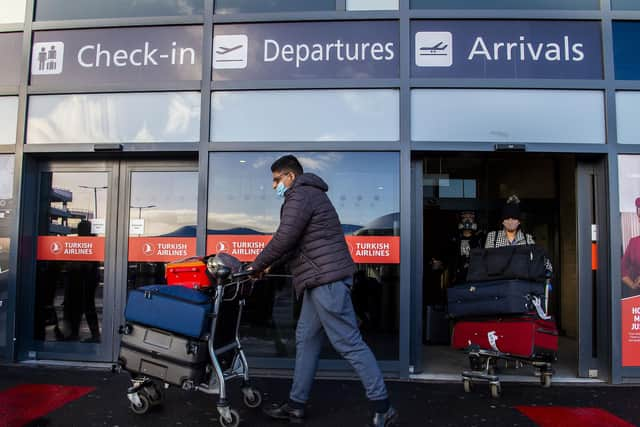UK will not be able to shut borders forever, warns Sage government adviser
Andrew Hayward, professor of infectious disease epidemiology at University College London (UCL) and a member of the Scientific Advisory Group for Emergencies (Sage), said that while it was sensible to try to stamp out chains of transmission of variants, new strains will continue to be a risk.
The discovery of the South Africa strain of coronavirus prompted a series of travel bans, with people arriving into England from anywhere outside the UK, Ireland, the Channel Islands or the Isle of Man needing to isolate at home for ten days and providing a negative Covid-19 test result before they travel.


Advertisement
Hide AdAdvertisement
Hide AdA system of quarantine is due to be introduced in coming weeks that will require those arriving from countries under travel bans to isolate in hotels.
Labour has urged the UK Government to go further and bring in a hotel quarantine system for all UK arrivals as a way of keeping out mutant strains.
But Prof Hayward said more attention needed to be paid to the "end game" as variants will pose an ongoing risk.
Asked on Sky News about the probability of more strains entering the UK unless borders are shut completely, or unless all people entering the country are forced into hotel quarantine for 14 days, Prof Hayward said: "Well, probably in the long term, 100 per cent.
"The nature of this virus is that it will continue to mutate, as do all viruses, and new strains will emerge and they'll emerge in many different countries in the world at different times, and you won't notice that they are spreading until such time as they are quite widespread.
"The real challenge here is that, well, yes, you can think about completely shutting the borders or having quarantine, [but] what's the end game in that?
"Is that something that you're going to do forever, because it looks like these strains may continue to arise in the long term?
"So we need some sort of sustainable strategy and I think that's very difficult for politicians to think about that."
Advertisement
Hide AdAdvertisement
Hide AdProf Hayward said at the moment scientists did not fully understand the potential of the new strains, though vaccines were still expected to be "very worthwhile" and keeping cases of the new strain low would assist their rollout.
But he said the 11 cases of the South African variant identified in eight different parts of England were only the "tip of the iceberg".
He added: "This variant is identified through genetic sequencing and we sequence between 5 per cent and 10 per cent of all cases, so you can immediately tell from that that we have a big under-estimation of the number of cases."
He said the 11 could be multiplied "by quite a high level", adding: "We would expect we're seeing the tip of the iceberg of community transmission."
Elsewhere, Professor Sir Mark Walport, former chief scientific adviser to the Government, said it was "almost impossible" to completely shut down the country and prevent highly transmissible new strains.
Comments
Want to join the conversation? Please or to comment on this article.
